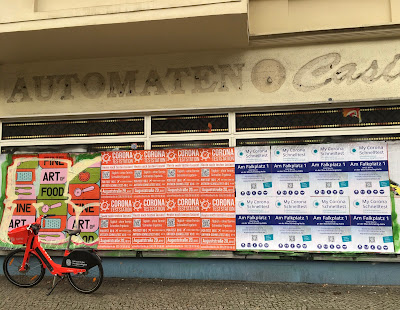#StayatHome
So here we are again, only this time it’s worse. We’re in the middle of the second wave of the Covid pandemic and the situation is serious. For the first time since the beginning of this crisis all three traffic lights of the coronavirus-warning system for Berlin are red. The number of Covid-related deaths in Germany is at a record high. The lockdown measures have been toughened once again and even stricter restrictions are expected to be announced next week.
Unless you keep a steady eye (or ear) on the local news, it’s impossible to keep up with all the changes. The Tagesspiegel App has become my bible. At the moment we can meet only one person from another household (children are now included in the calculation). We are not supposed to leave the house unless we have a valid reason. We are also not supposed to leave Berlin, or at least we can’t go further than 15 km from the border into Brandenburg, our neighbour state.
The spring lockdown was bad enough, but the winter lockdown is on another level. Winter in Berlin is always a difficult time of the year. I’m not just saying this because I grew up in Sicily. Even native Berliners struggle with the long, grey and dark days, when catching a glimpse of the sun for just a few minutes feels like a miracle. Now that we spend most of our time at home, the days and weeks are a blur. They all seem to be melting into one long week. It feels surreal. Is this really happening or is it all a bad dream?
Schools have been closed for a month now and the whole school situation has been terribly mismanaged, with conflicting information and backtracking on decisions. Home schooling is proving to be an even greater challenge than during the previous lockdown. Finding the assignments for the week is a bit like a treasure hunt, as the information is uploaded on different websites or arrives by email. Excuses to avoid studying include “I’m hungry”, “I’m tired”, “my arm hurts”, “I need the toilet” and my favourite “my pen exploded”. Today I read in the news that home schooling and working from home are not compatible. How insightful.
The online learning platform called Lernraum Berlin (the website that all teachers and students in Berlin are supposed to use) is totally unreliable and keeps crashing. On several occasions, we’ve had to resort to alternative websites for videoconferences. I’m starting to wonder if the people responsible for Lernraum Berlin are the same ones that were managing the construction of the “new” airport.
Talking of Berlin-Brandenburg Willy Brandt Airport (BER) airport, it has been back in the news this week, as employees have reported suffering electric shocks while checking passenger luggage! You couldn’t make this stuff up.
On a positive note, and to parents’ relief, the playgrounds in Berlin are still open, at least for the time being (this wasn’t the case in spring). Usually, playgrounds are deserted at this time of the year, but not now, as they are currently the only place where children can let off steam.
If you are looking for distractions to survive the winter lockdown, here are some recommendations.
This week I’ve been watching British sitcom Mum on the Arte App (where you can watch films and tv series in the original language without subtitles). It’s a slow-moving “comedy” with a great cast about a recently widowed, middle-aged woman called Cathy. It has funny moments, but it also makes you cringe. Some of the other characters are quite horrible and you do wonder how Cathy manages to stay so calm and gentle.
I also watched the documentary Bethany Hamilton: Unstoppable on Netflix . It tells the inspiring story of surfing champion Bethany Hamilton, who lost her arm in a shark attack while surfing as a teenager, and made a comeback against all odds.
Also on Netflix, the documentary The Social Dilemma will put you off using social media forever, or for a while at least.
I’ve been reading A Manual for Cleaning Women by Lucia Berlin, who has been praised as “a literary genius” in recent years. It’s a wonderful collection of short stories based on events from the author’s diverse and itinerant life. Whether they are based in laundromats, classrooms or the emergency room, Lucia Berlin tells vivid stories with humour and compassion.
I’ve also been reading The World’s Worst Teachers by David Walliams with my son. Plenty of funny moments in these gruesome stories about the 10 worst teachers in the world, with great illustrations by Tony Ross.
Finally, I’ve been listening to the podcast called The Writer’s Voice, where New Yorker fiction writers read their short stories. A great chance to hear a good story told by its author.
*The poster (pictured) tells Berliners to wear face masks and to follow the Corona-rules. It is a play on the words rumgurken, which can be translated as "hang out" and comes from the word Gurke, i.e. cucumber and Rübe, which means turnip or carrot but is also used to describe an ugly nose.







